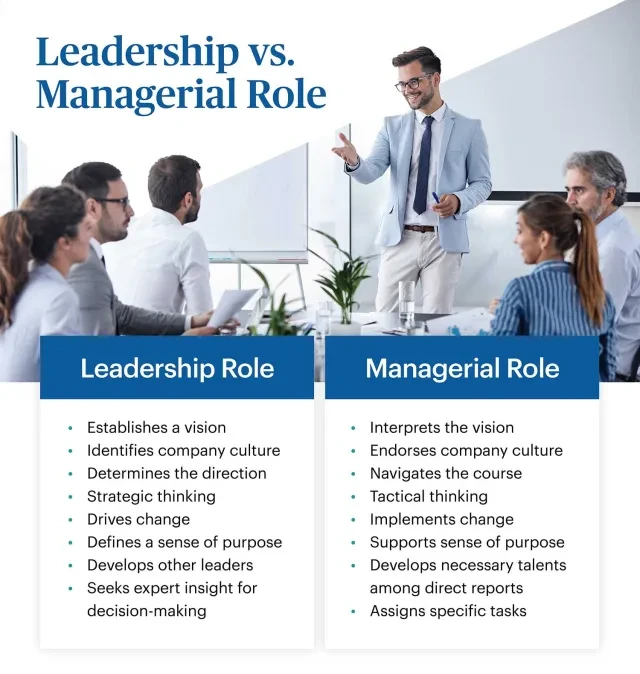- HCM
- Artículo
- Lectura de 6 minutos
- Last Updated: 07/06/2022
Leadership vs. Management: Benefits and Differences of Both

Table of Contents
Both leaders and managers are critical for business success. But what makes each of these roles unique, and how do they work together? This article explores more.
What Is the Difference Between Leadership vs. Management?
The term "manager" is often associated with someone who directs the work of others while a "leader" inspires others to do their best through their words and actions without dictating. Those are semi-accurate portrayals of leadership vs. management roles, and most people would rather be called a leader than a manager. But make no mistake: leadership and management are both vital to the success of a business.
What Is Management and Why Is It Important in Business?
Management often equates to the idea of control, but that is an incomplete description. Why is management important in business? Between a company's overarching purpose and its deliverables, there is a vast network of moving parts. Think of all the details involved in creating and implementing successful processes for procurement, product design and development, company culture, human resources, customer relationships, sales cycles, packaging, marketing, accounting, and much more. Management is responsible for using available resources to implement specific, achievable actions that coordinate these parts and propels a business toward its goals. Talented managers are individuals who can:
- Understand and interpret leadership's vision
- Endorse the company culture
- Develop and implement tactics
- Think in terms of execution
- Provide actionable instructions
- Plan and organize training
- Connect present activities to future outcomes
- React to change
- Advocate for subordinates
- Hold and exercise authority in a fair and equitable manner
- Drive success of direct reports
What Is Leadership and Why Is It Important in Business?
Management may be responsible for implementing tactics and organizing the actions that move a business toward its goals, but it's leadership that sets those goals. Leaders determine a company's overarching vision, goals, and direction, while managers handle the nuts and bolts of charting the course to get there. Leaders see the larger picture and focus on aligning, influencing, and motivating people to support their vision. They know how to motivate managers who can choreograph high-performance teams and outcomes. Leadership and business success rely on individuals who can:
- Identify and articulate a vision
- Drive a business's purpose
- Ask probing questions
- Seek insight
- Recognize organizational strengths and weaknesses
- Detect opportunities
- Anticipate business-wide challenges
- Create change
- Look toward the future
- Shape the culture
- Develop leadership in others
Are There Any Similarities Between Leadership and Management?
Many of the traits and skill sets of leadership and management overlap. However, even if a skill set is identical, how that skill set is used will vary across the two roles with each interested in different outcomes. Take, for instance, interpersonal skills. Managers tend to be more focused on building effective teams to complete specific tasks and objectives while a charismatic leader uses their interpersonal skills to inspire and motivate employees.
Leadership Role vs. Managerial Role
The qualities of a leader and a manager may sound similar, but each serves a distinct purpose within a business.

Which Is Better: Management or Leadership?
Leadership and management are both critical to an organization. The scope and roles of each can vary depending on the industry or business size. It's not uncommon for a business to have managers who are leaders and leaders who are not in management positions. There are many roles that use management and leadership skill sets.
Leadership vs. Management: Why Both Roles Have Value
While companies often say they are grooming leaders, both management and leadership are important functions.
Great managers may not have large spheres of influence, but they can be masterful at running projects and getting things done. They know how to plan, organize, and coordinate. When a company has a complex project to undertake, a smart manager knows how to execute.
A great leader, on the other hand, may be influential and have fantastic new ideas, but may not be so adept at managing the many ongoing details involved with getting a project done. Leadership is more about inspiring, motivating, and innovating.
How They Work Together
Businesses should aim to maximize the value of both managers and leaders. Ideally, that could mean hiring or promoting people who prove themselves to be both strong leaders and managers — and such people do exist.
Once a company knows of someone's ability to manage and lead — and whether they are better-suited toward one role or the other — it can help guide the company’s talent management decisions. For example, someone who demonstrates strong leadership potential — meaning they're influential and innovative — might thrive in a role that allows them to draw on their creativity or shepherd long-range planning. Someone who's a manager — great at project management and getting things done efficiently—might be right for a role that requires being highly detail-oriented and hands-on. Each job within an organization could be a better fit for someone who's either a stronger leader or a stronger manager. A company can write job descriptions that explain the skill sets that would be a good fit for each position.
Companies shouldn't overlook the opportunity to promote both leadership and management qualities among all their employees. Even though someone may be a stronger manager that doesn't mean they won't benefit from learning how to innovate and influence, and vice versa: a great leader could benefit from a lesson or two on managing projects and people. And don't forget, any employee, from entry-level to top-level executives, can demonstrate natural leadership abilities.
Strengthening Leadership, Management, and Your Business
Recognizing and nurturing leadership and management traits across all your employees can help your business be more resilient and adaptable, all while giving staff opportunities to grow and develop in their roles. HR consulting and HCM services can give you the perspectives and resources you need to take advantage of the business benefits of management and leadership development.
Tags







